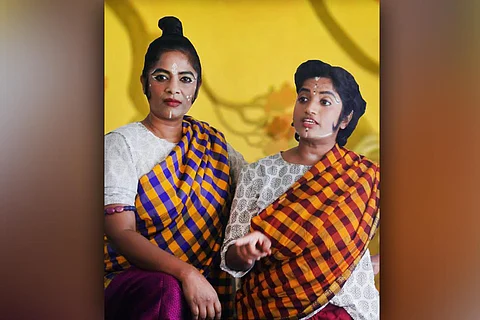

Desdemona Rupakam, a concert theatre performance centred on the character of Desdemona in Shakespeare’s Othello, examines the absence of female voices in the play as well as in traditional Indian mythology. Directed by award-winning playwright Abhishek Majumdar, Desdemona Rupakam will be performed by acclaimed musicians MD Pallavi and Bindhumalini Narayanaswamy.
Abhishek says the idea for the performance emerged from the question of why Desdemona – who was killed in a fit of jealous rage by her husband Othello on suspicion of having an affair – had so little to say. “The play started on the premise of what more she could have said had she been given agency to do so. I presented this proposition to Pallavi and Bindhu Malini, and that is how the idea for the performance came about,” says Abhishek, who has co-written the play with Pallavi, Bindhu Malini, Veena Appiah and Irawati Karnik.
Desdemona Rupakam is unique not just for its perspective but also for its performance format. It combines musical score, comprising Hindustani and Carnatic music, and folk forms such as Hari Kathe, Yakshagana and Yellamma Nataka, spoken word poetry, dramatic scenes, and Tishani Doshi’s poem ‘The River of Girls’. The sound design is by India’s well-known sound artist, Nikhil Nagaraj.
While the performance comprises the original text of Othello, for the musical parts of the play Pallavi and Bindhu Malini referred to different epics and stories from Indian mythology. “We have explored the stories of Dushyanta-Shakuntala and Renuka-Jamadagni. For every story, we use a different form, like Hare Kathe, Yakshagana and Yellamma Nataka. We also use Hindustani and Carnatic music because both of us are trained in it. Every time we move out of Othello and reference another story, we go into another form,” Pallavi explains.
Pallavi says that while the performance examines whether women have got equal representation in written texts, the viewpoints of even those women who have not been included in the texts have also been taken into account. “In Othello, we don’t know who the other women are. In this performance, we try to explore what Desdemona’s mother’s views could be, for example. Characters like Desdemona’s mother are not in our imagination in the first place.”
The performance also reimagines the character of Desdemona, and in the process tries to find answers of what she would have liked to say.
Bindhu Malini elaborates: “We expanded our search to look for what feminine voices are found or are not found in narratives, and then we looked into whether a story has been told in a musical tradition. For example, Renuka’s story is found in Yellamma Nataka, so the stories also inspired us to get a form into the performance.”
But even as Desdemona’s point of view has been explored, Abhishek says the play primarily looks at feminism in India. “Through this performance, we want to look inward – what spaces are feminist in our country, what spaces should be worked upon, and not measure it against the second wave feminism of the West between the 1960s and 1980s.”
Desdemona Rupakam is produced by independent arts studio Nalanda Arts Studio, and supported by Ranga Shankara’s ‘Play the Play’ programme. Upcoming shows are at 3.30 pm and 7.30 pm on Sunday at Ranga Shankara. Tickets are available on bookmyshow.com and at the venue.
Sravasti Datta is a freelance journalist with a decade’s experience in features journalism.